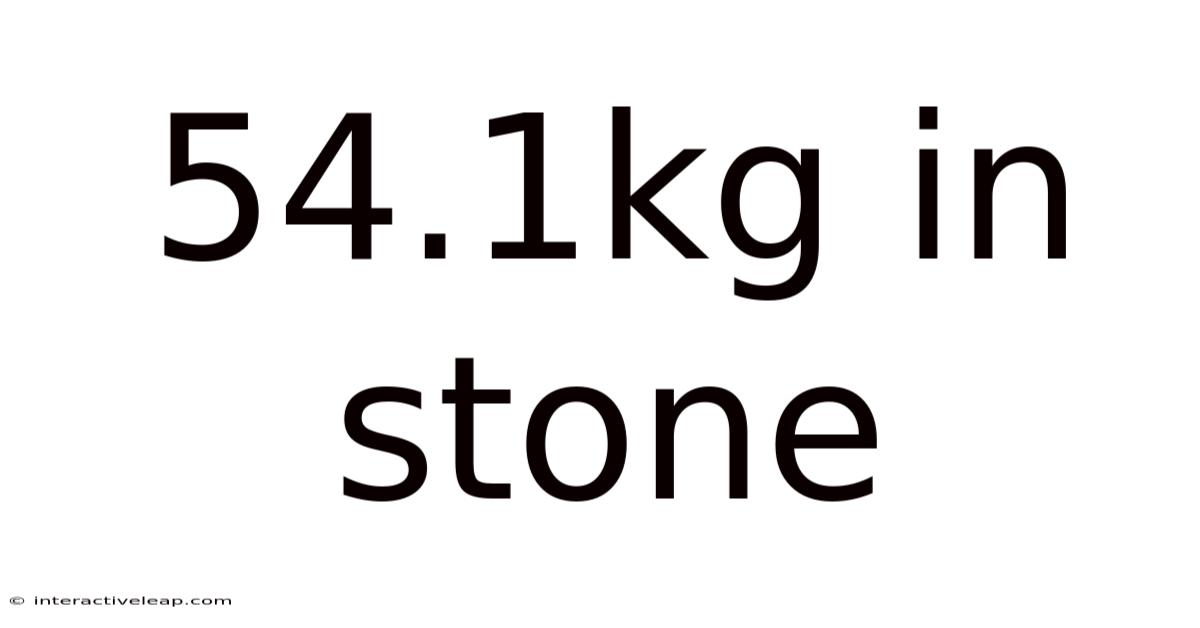54.1kg In Stone
interactiveleap
Sep 15, 2025 · 4 min read

Table of Contents
54.1kg in Stone: A Comprehensive Guide to Weight Conversion and Understanding the Imperial System
Converting weights between the metric system (kilograms, grams) and the imperial system (stones, pounds, ounces) can be confusing, especially when dealing with decimal points. This article provides a comprehensive guide to understanding how to convert 54.1kg into stones, explaining the process step-by-step and delving into the history and practical applications of both systems. We'll also tackle common questions and misconceptions surrounding weight conversions. By the end, you'll not only know the answer but also have a firm grasp of the principles involved.
Understanding the Metric and Imperial Systems
Before diving into the conversion, let's briefly review the two systems involved.
The metric system, based on powers of ten, is the dominant system globally, using kilograms (kg) as the base unit for mass. Its simplicity and ease of conversion make it ideal for scientific and international use.
The imperial system, primarily used in the United States and a few other countries, uses pounds (lbs) and stones (st) as units of weight. A stone is equivalent to 14 pounds, and a pound is further divided into 16 ounces (oz). This system’s lack of uniformity makes conversions more complex.
Converting 54.1 kg to Stones: A Step-by-Step Guide
The conversion process involves two main steps:
Step 1: Convert Kilograms to Pounds
The fundamental conversion factor is 1 kg ≈ 2.20462 lbs. Therefore, to convert 54.1 kg to pounds, we multiply:
54.1 kg * 2.20462 lbs/kg ≈ 119.27 lbs
Step 2: Convert Pounds to Stones
Since 1 stone (st) equals 14 pounds, we divide the pounds value by 14:
119.27 lbs / 14 lbs/st ≈ 8.52 st
Therefore, 54.1 kg is approximately equal to 8.52 stones.
Precision and Rounding
It's important to acknowledge the limitations of rounding. The conversion factor 2.20462 is an approximation. Depending on the required level of accuracy, you might round the final answer to 8.5 stones or even 9 stones. The level of precision depends entirely on the context. For general purposes, 8.52 stones is a sufficiently accurate representation.
The History and Context of Stones and Pounds
The use of stones as a unit of weight has ancient roots, tracing back to the medieval period in England. The stone was originally based on the weight of 14 pounds of wool. Over time, it became a standard measure for people’s weight, particularly in Britain and its former colonies.
The pound, also with ancient origins, has evolved through various standards across different cultures. Today, the pound used in the imperial system is defined in relation to the kilogram. The interrelationship between these units is what dictates the complexity of the conversion process.
Practical Applications of Weight Conversion
Understanding weight conversions is crucial in various scenarios:
- International Trade: Facilitates the seamless exchange of goods and services between countries using different measurement systems.
- Healthcare: Doctors and healthcare professionals often need to convert weights between systems to ensure accurate diagnosis and treatment.
- Fitness and Nutrition: Individuals tracking their weight and diet might encounter both systems, requiring conversion for consistency.
- Engineering and Manufacturing: Precise weight conversions are essential for designing and producing products that meet specific requirements across different markets.
- Shipping and Logistics: Accurate weight calculations are vital for shipping and freight companies to determine costs and manage transportation effectively.
Frequently Asked Questions (FAQ)
Q1: Why are there two different weight systems?
A1: The metric system arose from a need for a standardized and universally understood system, unlike the imperial system which evolved organically over centuries, leading to its less coherent structure.
Q2: Are there online calculators to help with conversions?
A2: Yes, many online calculators are available that can instantly convert between kilograms and stones, as well as other units of weight and measurement. However, understanding the underlying process is crucial for comprehending the result.
Q3: What is the difference between weight and mass?
A3: In everyday use, the terms are often used interchangeably. However, weight refers to the force of gravity acting on an object, while mass is the amount of matter in an object. Weight can vary depending on gravitational pull, while mass remains constant.
Q4: Is it possible to convert from stones to kilograms directly without going through pounds?
A4: Yes, you can use a single conversion factor derived from the others: 1 stone ≈ 6.35029 kg. You would simply multiply the number of stones by this factor to get the equivalent weight in kilograms.
Q5: Are there any historical variations in the definition of a stone?
A5: While the 14-pound stone is the most common standard today, historical variations have existed in different regions and time periods.
Conclusion: Mastering Weight Conversions
Converting 54.1 kg to stones demonstrates the importance of understanding both the metric and imperial systems and the procedures involved in their conversion. While online tools are convenient, grasping the fundamental principles allows for more confident and accurate calculations in various practical situations. Remember that precision depends on context, and rounding is sometimes necessary. The historical context of these units adds further depth to our understanding of their practical applications. By mastering these conversion techniques, you equip yourself with a valuable skill applicable across diverse fields and situations.
Latest Posts
Latest Posts
-
85grams To Oz
Sep 15, 2025
-
Intermittent Fire Alarm
Sep 15, 2025
-
98f To C
Sep 15, 2025
-
40 Times 8
Sep 15, 2025
-
6 5 Inches Cm
Sep 15, 2025
Related Post
Thank you for visiting our website which covers about 54.1kg In Stone . We hope the information provided has been useful to you. Feel free to contact us if you have any questions or need further assistance. See you next time and don't miss to bookmark.